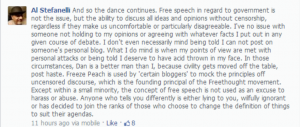This is funny. There’s some kind of “group,” which in this case apparently means Twitter group, that calls itself ASH, for Atheism Secularism Humanism. There are real ASH groups in the UK; we’re familiar with the LSE, UCL and Reading Student Union branches, which do good work and get accused of “Islamophobia” for their pains. The Twitter group seems to be a different kind of thing.
One of their number, self-styled “capn atheist,” [aka Steve] wrote a post about abjuring all groupism and exclusivity.
Hey everyone!
By now you’ve probably noticed a big change in how ASH has changed.
From here on out, there is no actual group, or exclusivity. Anyone that supports the ideas of Atheism, Secularism, and Humanism is welcome to use a “Twibbon” to show their support for those ideas.
See the problem? Of course you do. The surprising thing would be not seeing it.
There is no group, no exclusivity, no filter. Anyone who supports X ideas is welcome.
That right there? That’s a contradiction. Flat out.
I think I know what captn’s mistake is. I think captn is thinking that the ideas captn likes and wants to base a group on are not a filter, not a source of exclusivity, not a criterion for being part of the group (despite actually spelling out that that is in fact the criterion for being part of the group), while ideas captn doesn’t like are a filter and a source of exclusivity.
Let’s see if that’s confirmed.
The change was spurned on by the entire debacle of the Atheism+/ BlockBot.
When a group forms like Atheism+ it can have a negative impact or a positive one.
The problem with any “group” is it’s exclusivity. Not all people are included. The inherent problem with this has been demonstrated by the events of this past week, with the Atheism+BlockBot. This is a group that insists on it’s members adhering to a very stringent form of behavior. Witnessing this has been a learning experience for myself and many other people in the Atheist community on twitter.
Yes, that’s confirmed.
captn atheist seems not to realize that not all people are included in the ASH group either. Can I think of some people who aren’t included in the ASH group? Yes I can. Theists, theocrats, people who hate the values of humanism. Which is interesting, because some of those values are feminism, anti-racism, anti-homophobia and the like. Atheism+ values in short – the ones captn atheist opposes and considers “very stringent.” I think ASH should be calling itself AS instead; I don’t think it’s a humanist group. Atheism+, on the other hand, as many humanists have pointed out, is basically just another word for [atheist] humanism. How dare captn atheist hijack the word “humanism”!
It is because of this that ASH has now become what it really has always been, an affiliation of like minded people that support what the 3 letters of ASH stand for: Atheism Secularism and Humanism.
Can you explain how an affiliation of like-minded people can possibly not be exclusive? I certainly can’t. An affiliation of like-minded people is exclusive by definition – it excludes people who are not like-minded.
captn atheist wants to eat his cake and have it. He wants to add to the noisy chorus of people talking shit about Atheism+ while still keeping his own favored brand of groupism and exclusivity.
If you support the ideas that ASH represents you can chose to support them as you wish.
The ASH Twibbon has been created to allow all those interested in showing their support of Atheism, Secularism, and Humanism, a means to show it on their Avatar. It’s important to make the distinction that the Twibbon supports ideas we share, and not a group mentality.
Oh really? And how do they plan to do that? How do they plan to unite around ideas they share while avoiding any possible risk of “a group mentality”? How is it not in any way a symptom of a group mentality to have a “Twibbon” that shows support of Atheism, Secularism, and Humanism?
Previously, ASH (the group) had guidelines. Those guidelines have been eliminated in favor of NO limitations on anyone’s natural individuality.
From here on out…ASH is about what those letters mean. Atheism Secularism and Humanism nothing more or less.
How is that not a set of limitations on anyone’s natural individuality? Many people’s individuality is closely tied up with religion, so of course an atheist group entails limitations on anyone’s natural individuality.
It’s all a very blatant example of self-serving bias. MY limitations are good limitations therefore they’re not limitations at all; THEIR limitations are evil and bad, therefore they’re the most limiting limitations ever.
We are all individuals that share common interests. No “group” is needed, no “guidelines” are needed, the only thing that’s needed is your sincerity in helping to support these ideals.
That’s a limitation on my identity. What if I despise sincerity and love tricksterism, irony, performance, creative fantasy? And then, if we share common interests, then we don’t share non-common interests, so that’s another limitation on my identity, as is being asked to support these ideals at the price of different ideals.
You can’t have something and nothing at the same time. You can’t have a cause without having a cause. You can’t abjure one particular cause while embracing another and pretend that’s a rejection of all causes.
(This is a syndicated post. Read the original at FreeThoughtBlogs.)




